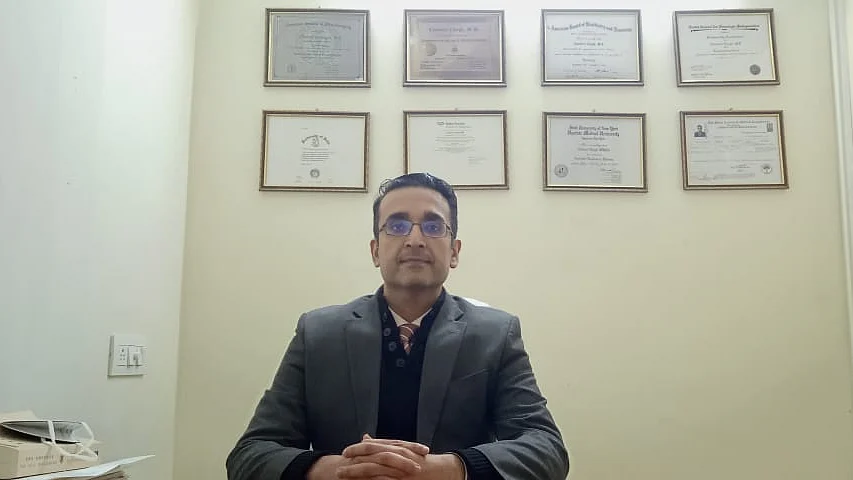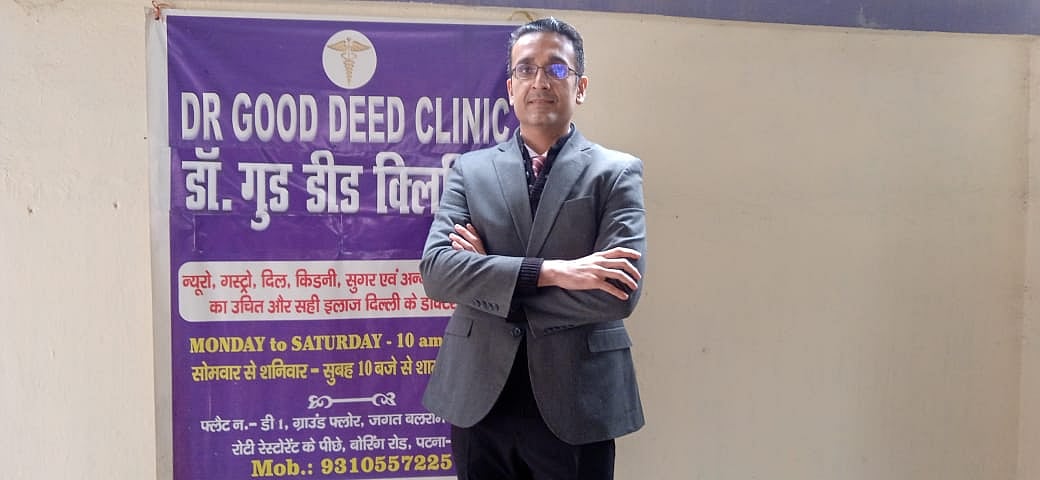Primary healthcare system needs revival: Dr Chandril Chugh, top neurologist now helping unprivileged in Bihar
Dr Chandril Chugh, trained in US to perform lifesaving brain surgery, moved to Bihar to serve unprivileged patient in small towns and villages after disillusionment with ‘corporate hospitals'

The story of the journey of a highly trained neurologist from the gleaming, sanitized environs of some of the most-acclaimed US-based medical schools and hospitals in the world to the dusty, chaotic streets of Bihar with a mission to dispense affordable and efficacious medical care to economically unprivileged patients might sound like something straight out of a movie script.
It may sound even more unlikely that such an individual, facing challenges such as patients skeptical of the intent behind such an endeavor, disparagement by peers and long separations from loved ones wouldn’t consider returning to a far more lucrative and steady tenure at a corporate-run tertiary healthcare facility in a metropolitan city.
Dr Chandril Chugh is, however, not the kind to give up easily. “It’s sometimes difficult to keep at it in the face of great odds. The biggest challenge is that most people remain unconvinced that a well-qualified medical practitioner indeed wants to provide them quality medical care without charging them a small fortune. But I don’t intend to quit anytime soon. I believe that my good intentions and perseverance will eventually bear fruit,” he says.
Dr Chugh (41) specializes in minimally invasive brain procedures. He is skilled in endovascular surgical neuroradiology, a coveted medical super-specialty that has revolutionized critical patient care by eliminating the need for open brain surgery. Indeed, he is one of the most acclaimed neurologists not only in India but even in the US, where he received higher education at Loyola University Medical Center in Chicago, the ivy league Perelman School of Medicine at University of Pennsylvania and Texas Stroke Institute in Texas.
Despite the attraction of setting up a practice in the US, he decided to return to India in 2016 – ‘because it is home’, as he puts it – and joined as head of the department of interventional neurology at a reputed tertiary care corporate hospital in Delhi.
During that tenure, he helped save the lives of innumerable patients, but was eventually disillusioned with the ‘corporate culture’ at such hospitals, where, he says, patient welfare is secondary to revenue generation to such an extent that he began to abhor the system.
He then decided it was time for him to pursue his vision of helping the disadvantaged sections of society. He moved to Bihar, because it lags behind other states in medical care and scores poorly on socioeconomic indices. “It perhaps has the poorest healthcare system and poor patients can ill afford proper medical care,” he says.
He established an NGO, Sankat Mochan Trust, and set up clinics under the name ‘Dr Good Deed’, because, he says, his prescriptions always advise patients to perform at least one good deed a day, something, he says, makes you feel good about yourself at the neurocognitive level and helps with the healing process.
“I want to provide reliable medical opinion and a trustworthy line of treatment to patients at the primary healthcare (PHC) level so they don’t need to flock to big cities like Delhi where they are forced to spend large amounts of money at expensive private hospitals, often ending up in penury and indebted for life. Or else they spend months on the roads outside AIIMS in scorching heat or freezing cold,” says Dr Chugh, who has a cumulative experience of over 16 years.
So far, he has set up tele-consult clinics in Ramnagar, Betia, Chhapra and Arah. “The idea is to try augment the primary healthcare (PHC) system at the grassroots. The whole trouble problem with India’s healthcare system today is that the PHC system is in shambles. PHC clinics neither have qualified doctors nor any semblance of infrastructure to tend to the ailing,” he says.
“It is extremely unfortunate that the once-robust PHC system set up and nourished by successive governments after independence has now become practically defunct, with neo-liberal regimes serving corporate interests without any qualms. If the PHC system was functional, lakhs would not have died in the second COVID wave with their bodies getting dumped in the rivers,” he points out.
Dr Chugh spends most of his time at the clinic in Patna which is the hub and nerve center of his project. It is here that he usually operates from for over ten hours a day, fielding calls from scores of patients.

Asked how his clinics worked, he says, “Anyone can walk into the clinics and avail of a video conferencing consultation. He/she will be given a prescription which may include necessary medications and diagnostic tests. A nominal amount is charged for the consultation and we have tie ups with diagnostic labs to provide their services at the lowest possible cost to such patients.”
He adds that he follows the philosophy of not prescribing medicines or tests unless they are absolutely necessary. “Anyone suffering from a certain ailment doesn’t necessarily need dozens of medicines or tests. Taken over a long run, medicines are toxic. The idea is to give minimal medication and let nature take its course,” he says.
“I’m often surprised by doctors boasting that someone has been his/her patient for 30 years or so. Why should that be necessary? What kind of a doctor are you that you can’t help the patient recover quickly?” he says.
Dr Chugh also believes that a doctor’s role is not limited to treating sick patients. “A doctor has much more to offer to the society in terms of promoting wellness, healthy habits, awareness about mental health, dealing with death and disability. A doctor, having been through the tough and exhaustive grind of academics, professional practice and emotional turmoils of the diseased and their families, can be a guide to people in dealing with hardships of life and motivate them to have a new beginning every day. A doctor can teach the balance between work and life. As doctors we need to evolve into a new breed of experts who are not just care providers for the sick but rather as a life coach for them ,” he says.
Incidentally, Dr Chugh’s wife, Dr Nivedita Pandey, who too earned her spurs in the US where the two of them met before marrying after several years of courtship, is a senior gastroenterologist and hepatologist in Max Hospital, Saket.
“She too attends to patients from Bihar through tele-consultation, but only for a few hours. We can’t have her leave her assignment right now because someone needs to hold the fort in the financial sense of the term. We are spending all our life savings at Dr Good Deed clinics. But she will eventually join me full time,” Dr Chugh says.
Indeed, the lack of funds is proving to be something of a stumbling block, but the duo is determined not to accept funds from entities that may have a vested interest in profiteering by exploiting the misery of sick people. “That is the whole problem with the healthcare industry right now, and this is what propelled us to chart out this course of action. So it will be self-sabotage for us to accept that kind of funding,” Dr Chugh says.
Asked how long it would be possible to go without adequate funds, he says that as per his model for the project, it would at some point of time attain critical mass and become self-sustaining.
“We do charge some money from the patients who are all, of course, outdoor patients. We believe that every possible endeavor must be made so that they don’t need to be admitted as in-patients. In big, private hospitals, they try to admit most of them just to generate revenue though even the OPD fee is high making many patients reluctant to go for follow-ups. This is a flawed healthcare model which does not have the best interests of the patients at heart,” he says.
Nor is it easy for him to deal with peers and former colleagues who, he says, seem to believe that this chapter of his life and career reflect his underwhelming performance and success as a doctor. “Nothing could be further from the truth, of course, but I have now reached a point where I don’t really care or mind. What’s important is that my loved ones support me wholeheartedly,” he says.
On other practical hurdles in his way like bureaucratic apathy or obstructionism, Dr Chugh says he was fortunate not to have encountered that so far. “But yes, when we tried to make them realise the urgent need to reform and augment the PHC sector, there wasn’t much of a response,” he says.
Asked what motivates him, he says that nothing gives him more joy than seeing his patients feel better and on their feet as soon as possible. He cites the instance of a 45-year-old resident of east Delhi who fell down unconscious while playing badminton.
“An MRI scan revealed a massive brain stroke, and I immediately operated on him. I was unsure of how it will turn out, but the very next day, he was up on his feet. The blessings I received from his wife and family later was something I will never forget. It is these kinds of things that keep me going,” Dr Chugh says.
Follow us on: Facebook, Twitter, Google News, Instagram
Join our official telegram channel (@nationalherald) and stay updated with the latest headlines